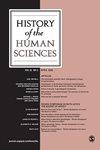在英国的过去中寻找现代性:社会人类学与英国社会史的重塑,1959-77 年*。
IF 0.5
2区 历史学
Q2 HISTORY & PHILOSOPHY OF SCIENCE
引用次数: 0
摘要
1959 年至 1977 年间,英国历史学家借鉴人类学典范重塑社会史。埃里克-霍布斯鲍姆(Eric Hobsbawm)的 "原始叛逆者"、彼得-拉斯莱特(Peter Laslett)的《我们失去的世界》、基思-托马斯(Keith Thomas)的巫术研究以及 E. P. 汤普森(E. P. Thompson)的 "道德经济 "都受到了当代社会人类学的启发,它们改变了历史学家对过去的理解。重建这一跨学科研究的时刻有助于我们了解世纪中期人文科学的广泛变化。这是一个关于 "现代化"、资本主义和工业化的宏大理论的时代。社会史学家通过类比过去和人种学的现在来回应这些关切。由此产生了许多极具影响力的社会变迁研究,这些研究向那些试图从英国的过去中创造出抽象的现代化模式的人提出了新的问题。本文章由计算机程序翻译,如有差异,请以英文原文为准。
Finding modernity in England's past: Social anthropology and the remaking of social history in Britain, 1959–77*
British historians drew on anthropological exemplars to remake social history between 1959 and 1977. Eric Hobsbawm's ‘primitive rebels’, Peter Laslett's World We Have Lost, Keith Thomas’s studies of witchcraft, and E. P. Thompson's ‘moral economy’ were all inspired by contemporary social anthropology, and they transformed historians’ understanding of the past. Reconstructing this moment of cross-disciplinary research contributes to our understanding of broader changes in the mid-century human sciences. This was a moment of grand theorizing about ‘modernization’, capitalism, and industrialization. Social historians responded to these concerns by drawing analogies between the past and the ethnographic present. The result was a number of hugely influential studies of social change that posed new questions to those seeking to create abstract models of modernization out of the English past.
求助全文
通过发布文献求助,成功后即可免费获取论文全文。
去求助
来源期刊

History of the Human Sciences
综合性期刊-科学史与科学哲学
CiteScore
1.60
自引率
11.10%
发文量
31
审稿时长
>12 weeks
期刊介绍:
History of the Human Sciences aims to expand our understanding of the human world through a broad interdisciplinary approach. The journal will bring you critical articles from sociology, psychology, anthropology and politics, and link their interests with those of philosophy, literary criticism, art history, linguistics, psychoanalysis, aesthetics and law.
 求助内容:
求助内容: 应助结果提醒方式:
应助结果提醒方式:


